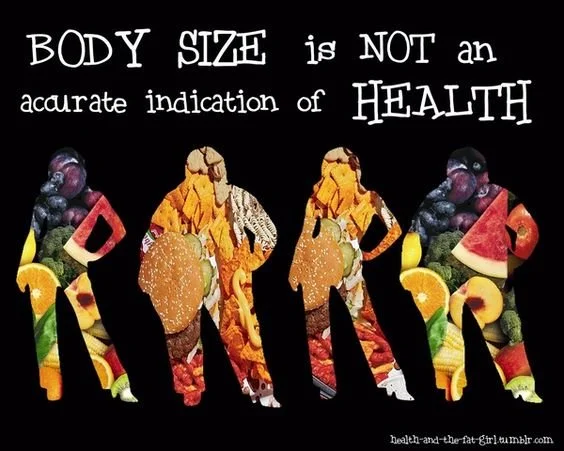So If Not Dieting, Then What?
In a world often obsessed with dieting and weight loss, it’s crucial to know that there are other options. While dieting may offer short-term results, it often falls short of promoting sustainable change long term. Dieting long-term is a strong predictor of future weight gain, body dissatisfaction and disordered eating behaviours such as binge eating.
When a lot of my clients come to work with me, they are fed up with dieting. They know that dieting is not giving them any benefit and dieting has contributed to a stressful relationship with food and feel disconnected from their body.
So in this blog post, I will explore in detail 4 different alternatives to dieting that I use with my clients that focus on fostering a healthy relationship with food, the body and most importantly, the mind.
Health at every Size (HAES)
Image taken by Inbodyment Counseling
What is HAES?
HAES stands as a powerful social justice movement, prioritising health over traditional weight loss approaches. This movement centres around five principles: weight inclusivity, health enhancement, eating for well-being, respectful care and life-enhancing movement.
Rather than fixating on body size, HAES champions the idea that diversity is a natural part of our world, especially when it comes to body shapes and sizes. It declares that individuals of all dimensions have the potential to embrace health.
HAES Challenges Traditional Weight Focus Approaches to Health
HAES fundamentally challenges the prevailing weight-centric paradigms in the realm of health. This is in contrast to the widespread advice that often urges weight loss as a universal solution. HAES encourages the view that health is not determined solely by the number on the scales.
Their goal is to end weight bias, discrimination and stigma to ensure you get the care and support you truly deserve rather than the “just lose weight” approach.
HAES encourages practices like body acceptance, mindful eating, and joyful movement. It recognises that health is multidimensional and that physical, mental, and emotional well-being are interconnected.
What are the Benefits of HAES?
By adopting the HAES approach, a study found that people were able to maintain long-term behaviour change compared to a restrictive/diet approach. Studies exploring the HAES approach have revealed that individuals were more successful in sustaining long-term behaviour changes compared to those following restrictive diets.
Furthermore, adopting HAES principles has been associated with increased awareness of bodily cues related to hunger and fullness, leading to improved health markers such as blood pressure and blood cholesterol.
2. The Non diet approach
What is the NOn diet approach?
The non-diet approach, often referred to as ‘intuitive eating or ‘weight-inclusive’ approach, is a significant departure from the conventional dieting mentality.
Rather than fixating on weight loss as the ultimate and only goal (you know the ‘lose X amount of stones in X weeks’ messaging), it shares the common goal with HAES in shifting the focus from weight loss to a more comprehensive view of health.
At its core, it encourages individuals to develop a connection to their body's cues such as hunger and fullness, promotes self-compassion, and fosters a positive relationship with food.
It supports you to get rid of strict food rules
Instead of rigid food rules or restrictions, the approach advocates for a flexible approach to eating that respects your hunger and fullness levels. It supports you to challenge food rules and food fears that have developed from years of dieting.
It acknowledges that food is not solely a source of fuel but a delightful and satisfying experience that should be enjoyed. By allowing all foods without putting the morval value on yourself (I am bad for eating this) so you can end guilt, shame or judgement. Read here to learn more about the negative effects of dieting on your mental health.
It supports the notion that food choices should be guided by pleasure, nourishment, and the body's natural cues rather than external rules.
Benefits of the Non-Diet Approach
By shifting the focus from weight loss to focusing on health, individuals often experience improved mental and emotional health. They develop a greater sense of body acceptance and self-compassion.
Furthermore, flexible eating patterns allow individuals to reconnect with their body's natural cues, leading to better hunger and fullness awareness. This heightened awareness can lead to improved overall health and a reduced reliance on external dietary rules.
The health benefits are huge as a non-diet approach can lower cardiovascular risk, improve glucose levels, increase the overall quality and variety of the diet which is optimal for health and reduce disordered eating behaviours such as binge eating.
A word of caution… be aware of healthcare professionals (or ‘influencers’) who promote a non-diet approach but then recommend regular weight checking and strict meal plans. This is not a non-diet approach, in fact, this is a diet.
3. Mindful Eating
What is Mindful Eating?
Now, I know you have heard of mindful eating. In a nutshell, mindful eating is about getting rid of distractions and learning to be fully present during meals. Maybe you have tried it a few times but it’s never really stuck. I think mindful eating is often painted by social media as this woo-woo approach, but in reality, it’s pretty simple and effective.
No Rush, No Distractions
It encourages you to slow down and savour each bite while paying attention to the taste, texture, and satisfaction that food provides. It stimulates you to eat with intention, to recognise your true hunger, and to distinguish between physical and emotional hunger. It fosters a mindful relationship with food, promoting self-awareness and balanced eating habits.
Now, for most of my clients, being mindful at every single meal is not realistic. This might be why some of you ‘had a go’ but never really stuck to it and thought ‘its not for me’.
Tip: Why not start by doing at least one meal or snack a day? Make a conscious effort to have that meal or snack sat at the dining table without the television or your phone and be in tune with your body. Give it a go, and let me know how you get on!
Benefits of Mindful Eating
Studies have shown that practising mindfulness during meals can improve digestion, weight management, and reduced stress levels. Moreover, individuals who engage in mindful eating often report higher levels of satisfaction with their food choices and a greater sense of overall well-being.
One of the most significant advantages of Mindful Eating is its ability to promote a healthy relationship with food. By savouring every bite without judgement or guilt, individuals can break free from the cycle of emotional and mindless eating. This approach supports the notion that food should be enjoyed not only for its nutritional value but also for the joy it brings to our lives.
4. Body Image Support
What is Body Image Support?
Body Image Support refers to a collection of practices and resources aimed at fostering to improving the self-perception of one's body. In a world often dominated by unrealistic beauty standards, this support provides guidance and tools to help individuals develop skills in self-compassion and self-acceptance.
It’s Not About Being ‘Body Positive’
The body-positive movement has been huge, and I am in no way putting it down. But for a lot of people and clients I work with, being ‘body positive’ is actually not achievable. Look, I love being realistic with my clients but why strive for something that's not achievable?
Therefore, support for your body image may look like embracing body respect/acceptance/liberation/gratitude. To give an example about how this works, body respect comes from the idea that you don’t have to love every part of your body to give it respect and is saying negative things to yourself respectful?
There is not one approach that fits everyone so it's finding out what approach really works for you.
What are the Benefits of Body Image Support?
Individuals who actively engage in practices to improve body image like self-compassion report increased self-esteem, reduced anxiety and depression, and an overall improvement in their mental and emotional well-being.
Professional guidance can offer invaluable tools for navigating the complex terrain of body image struggles. Therapy and support can help individuals uncover the root causes of their negative body image and develop healthier coping mechanisms.
What to do next?
All these approaches interlink around a adopting a gentle, balanced and compassionate approach to nutrition and body image. I work in a way that incorporates all the approaches in this blog so if you want to know more about how I can support you, don’t hesitate to reach out to me.
My Mission: Embracing a balanced and sustainable approachut
At The Binge Dietitian, my mission is simple yet powerful: to help yo-yo dieters liberate themselves from binge eating and find lasting peace with food. I am passionate about guiding you towards a healthier relationship with both your body and the food you consume. Together, we will set sustainable and realistic goals that support your overall well-being.





